Capryloyl glycine is a lipid amino acid. It is obtained by acylation of glycine to the octanoyl fatty chain. Glycine is the simplest and only one-amino acid that does not have a chiral carbon. It is also used for the biosynthesis of a plurality of important physiological substances in the organism.
It is one of the main components of dermal structural proteins, therefore, it plays an extremely important role in the skin, especially in the metabolism of skin cells and skin moisturising. Caprylic acid and glycine are both widely found in plants.
The combination is beneficial in skin moisture retention and collagen synthesis. It can regulate alkaline-acidity, balance the skin’s environment, prevent excessive keratinisation and inhibit harmful microbes. So it brings unique, multiple functions to personal care, including:
- Moisturising
- Anti-wrinkle
- Acne care
- Dandruff removal
- Improvement of seborrheic dermatitis symptoms
- Enhancement of antiseptic effects in formulations.
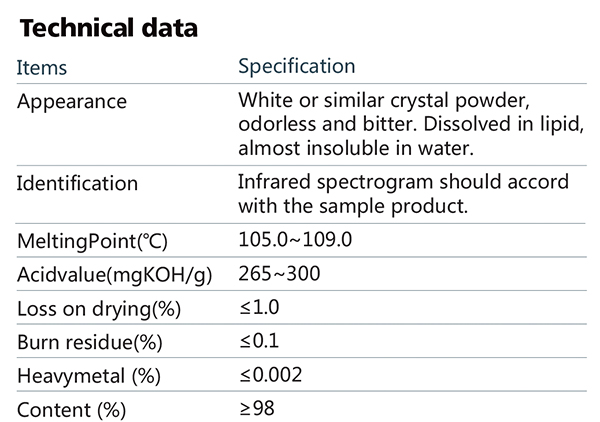
Function
Moisturising
Glycine is a component of the cuticle’s natural moisturising factor (NMF). It is also the main component of dermal structural proteins. Both of them play an extremely important role in skin moisturising and are indispensable factors in the natural moisturising system of the skin.
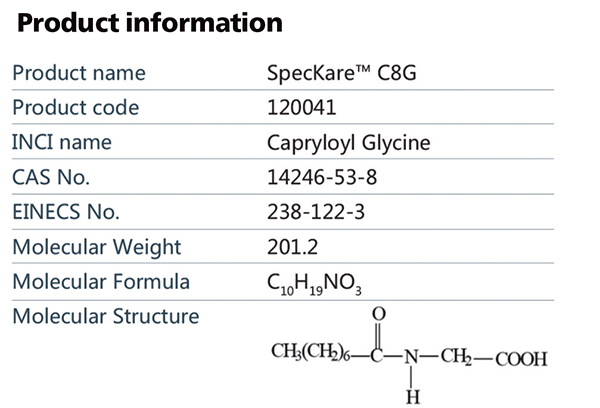
Wrinkle reduction
Glycine is the main structural component of dermal collagen, accounting for about 35%. At the same time, another structural protein of the dermis, proelastin, the basic form of elastin, also contains a large amount of glycine.
Skin acid regulation
In general, human skin has an acidic pH. This acid pH is closely related to the presence of natural lipoproteins. However, the invasion of a variety of substances can cause the decarboxylation of these lipoproteins, and also cause an alkaline skin pH (amines are harmful to the skin).
So it is necessary to add acidic active ingredients to cosmetic formulas to maintain an acidic pH value. Capryloyl glycine is used to build this acid barrier to help maintain good skin health. When glycine is combined with octanoic acid, the free carboxyl group (-COOH) shows a strong acidification buffering effect, allowing the skin pH value return to a desirable condition of weak acidity.

Experimental conditions
- Five volunteers
- The upper forearm skin was used as the experimental site
- Two areas were selected as the experimental area and the placebo area for testing
- The skin was treated with alkalising agent (pH10.4) and the pH value of the skin was measured after alkalisation
- The test site was then treated with 1.5% capryloyl glycine (pH4) emulsion
- The values of 15min, 30min, 1hr, 2hr and 4hr in the experimental area were determined and compared with the placebo group.
Results
The experimental results showed that the emulsion containing capryloyl glycine could make the artificially alkalised skin acidic.
Moreover, when invasion occurred, capryloyl glycine could restore and maintain the acidic ‘coat’ of the skin, thus promoting the skin’s microecosystem to reach a balanced state quickly.
Figure 1: Determination of effect on degree of acid on skin
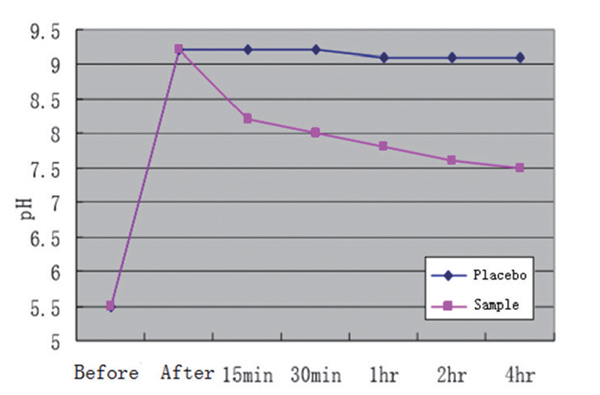
Conditioning effect on seborrheic dermatitis symptoms
Seborrheic dermatitis is a benign chronic irritation caused by bacteria or fungi such as Pityrosporum orbiculare. Three symptoms are usually observed when such stimulation occurs:
- Abnormal skin oil secretion, resulting in dandruff and greasy hair
- Large flaky scales
- Red scalp and sensitive.
Figure 2: Score table for epidermis of the criterion
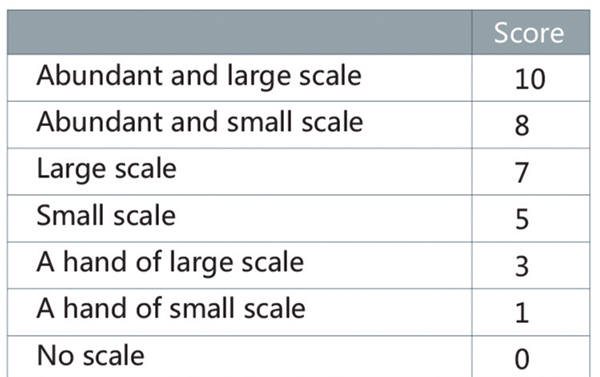
The treatment of seborrheic dermatitis by capryloyl glycine is mainly carried out via the following functions:
- Regulation of the weak acidic state of the skin to prevent excessive keratinisation of epidermal cells, thereby reducing dandruff
- Inhibition of the activity of the key enzyme of sebum synthesis, —5α-reductase, to reduce sebum secretion and improve skin condition
- Capryloyl glycine’s ability to kill Pityrosporum orbiculare. This prevents the breakdown of fat into fatty acids, reduce the stimulating effect of fatty acids on the scalp.
Figure 3: Epidermal desquamation evaluation

The main antibacterial mechanisms? The amphoteric structure of capryloyl glycine allows it to readily react with the cell membrane, so they can quickly penetrate the bacteria. Capryloyl glycine also has a anti-decarboxylase effect, blocking the decarboxylase of ornithine and lysine, thus hindering the metabolism of microorganisms.
S Snider (Department of Pharmacy, University of Milan) has tested the skin care effects of capryloyl glycine. Under the skin dermatitis model in vivo test, 40 people with seborrheic dermatitis symptoms were tested, evaluated by figure 2.
Figure 4: Scalp criterion score table
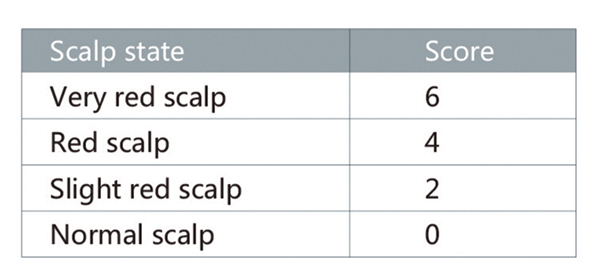
The effect of 2% capryloyl glycine was evaluated. The testers used the 2% capryloyl glycine shampoo once every three days over two months, and were scored every two weeks over that two month period.
a. Improving epidermis scales
Result as in figure 3: After one month, the scales became smaller and the amount of scales decreased. After two months, the effect is more obvious.
b. Improving scalp irritation
Baseline on the scalp inflammation evaluation, according to figure 4. Result as in figure 5: After two weeks there is a noticeable improvement: After one month: there are no scalp irritation symptoms. After two months, there is a more noticeable improvement. The results show that capryloyl glycine has an excellent effect on improving scalp irritation.
c. Sebum secretion adjustment
Figure 6 as benchmark for the evaluation of sebum secretion. Result as in figure 7: We can observe the inhibition of excess secretion of sebum, when the shampoo contains capryly glycine. The shampoo can normalise the secretion of scalp and hair.
Figure 5: Scalp stimulation level evaluation

Inhibitory effect on microbes
Capryloyl glycine can enhance the antiseptic effect of cosmetics. It has broad-spectrum antibacterial activity on gram positive bacteria, gramnegative bacteria, yeast, fungi and certain mycobacteria.
Figure 6: Sebum secretion appearance mark sheet
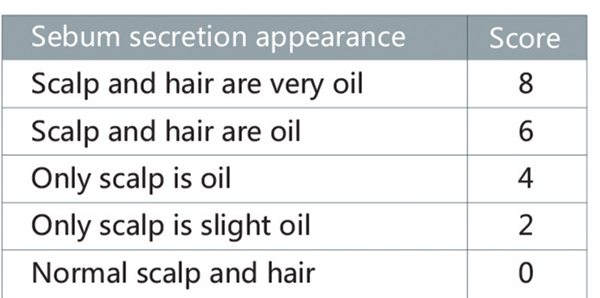
Application
Compatibility
Capryloyl glycine has synergistic effects with a variety of common preservatives, including deoxyphenobarbital, dihydropteridine, trichlorphenylurea and dichlorophenoxychlorophenol.
In addition, it also has synergistic effects with essential oils, undecenoic acid or octanoic derivatives, polyols and some alcohols, tea tree oil, etc.
Figure 7: Sebum secretion appearance evaluation

Formula
The ingredient can be used for all types of formulas: oil-in-water and water-in-oil creams, moisturisers, milks, shampoos, antibacterial soaps and liquid soap products.
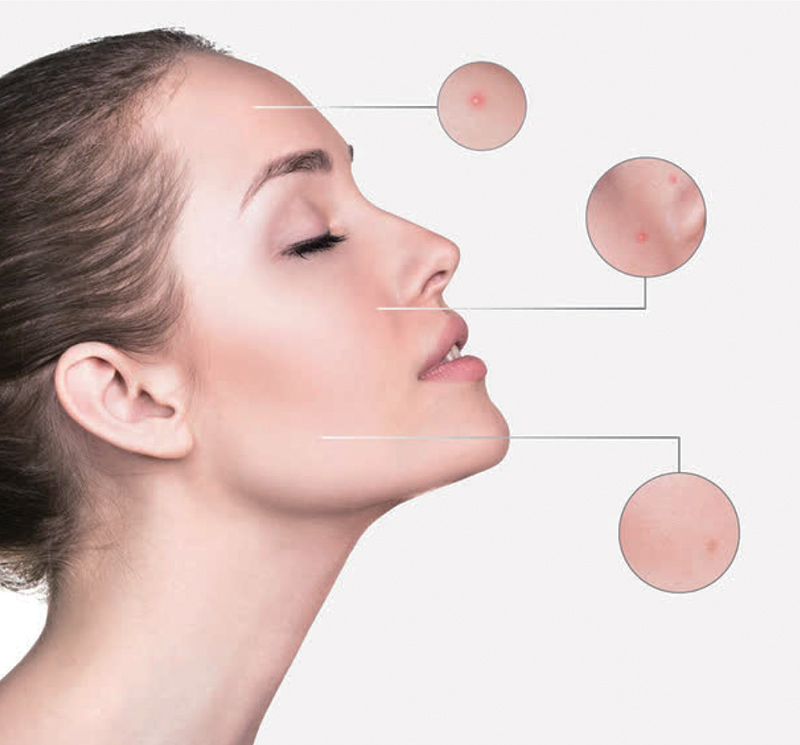
Products
Capryloyl glycine is ideal for use in anti-dandruff products, anti-acne products, no-preservative and low preservative products, products for sensitive skins and hypoallergenic products:
- Special effect on Staphylococcus epidermidis-acne removing products
- Special effect on Propionibacterium acnes-anti-acne products
- Special effect on Pityrosporum orbiculare-dandruff products
- Sensitive skin area, sensitive skin products, anti-allergy products
- Mix with other no-preservative products.
